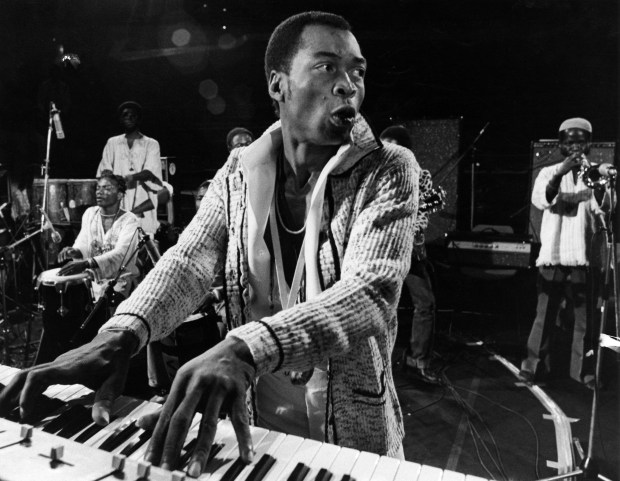The Lagos episode is filled with great music, from Afrobeat to Afrorock and psychedelic rock—you name it, they’ve got it. Here’s a playlist of all the greatest hits so you can dip your toes into Nigeria’s incredible music culture.
First up:
“Point of No Return,” by The Funkees
The Funkees were a Nigerian Afro-rock band that formed in the mid-1970s, after the Nigerian Civil War. This song infused a funk beat with a sick guitar solo that just makes you want to dance.
“Grottic Depression-1,” by Grotto
Grotto, another funk-based Afro rock group, was one of the most popular bands in Nigeria in the 1970s. Grotto was formed by artists from the band War-Head Constriction after it broke up.
“Graceful Bird,” by War-Head Constriction
Although this song is not featured in the episode, it’s a great example of how rapidly rock evolved in Nigeria.
Psychedelic rock played a huge part in Nigeria’s music culture in the 1970s. While its bands started to crop up a bit after the psychedelic movement in the West, they established a sound that was uniquely their own while still making you wonder if Jimi Hendrix could be playing the guitar solo.
“Allah Wakbarr,” Ofo and the Black Company
While “Allah Wakbarr” is the most popular jam that Ofo and the Black Company put out, “Egwu Aja” is an upbeat rhythmic dance masterpiece that should not be left unheard.
“Egwu Aja,” Ofo and the Black Company
“Chant to Mother Earth,” by Blo
This song is probably the most psychedelic on this list. The instruments flow like the rhythm of waves and transform you into a greater being. No, I am not high right now. Berkley “Ike” Jones, guitarist for Blo, said that Mother Earth spoke to the band and told them to write this song—and, well, I believe it.
“Zombie,” by Fela Kuti
Fela Kuti is one of the biggest acts to come out of Nigeria and was the pioneer of Afrobeat music. Afrobeat infuses funk, American jazz, rhythmic percussions, and indigenous West African music styles into one unique genre.
Besides being a multi-instrumentalist, Kuti was a singer and an activist. He created a commune and recording studio called Kalakuta Republic and declared it independent from the Nigerian government. During the 1970s, Kalakuta Republic was subject to frequent raids, but Kuti could not be contained. In 1977 he released “Zombie,” which became an instant hit for its criticism of the Nigerian military.
Three of his children, featured in the episode, are involved with music in various forms. Femi Kuti and Seun Kuti both perform Afrobeat. Seun actually leads his father’s former band Egypt ’80, which Femi also played with before starting a new band, Positive Force. Kuti’s daughter, Yeni Kuti, is a journalist in Nigeria and works with her father’s organizations to spread the power of Afrobeat music.
Below is a video of Femi and Seun Kuti playing together on Lagos Island.
